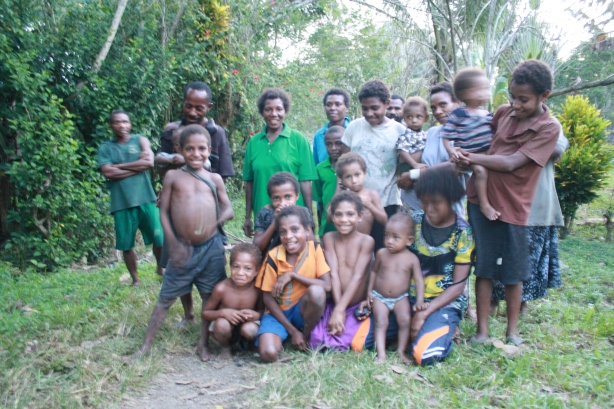Benny Kapior:
We did not want the oil palm to come and take our land for oil palm. We want to do things our own way on our own land. We also want to take care of our land, the environment.
West New Britain has become an oil palm province. Now the landowners of West New Britain aren’t in a good position, they are being marginalised. The landowners lose their land and people from outside the province come in to get jobs with New Britain Palm Oil. And they are not in control of big companies. If we let the government or a foreign company come in and use our land, we have no control over our land, they can throw us off our land.
The company came here and told us they had lots of development plans for us, they told us they would help change our lives for the better, that sort of thing. They raised people’s expectations by promising development. But we are planting cocoa.
We plant cocoa and dry the beans here, and we sell it at the market in Madang. So we keep control of our land and of our lives. The social life of Urigina is much better than other communities who have given up their land and resources to big companies.
We plant other crops for our own consumption and we plant the cocoa as a cash-crop, to make an income. How much we make depends on the world market: if the price is good we can make around 400 kina per bag (each bag is around 60kg), or as low as 200 kina when prices are down, as they are currently.
We hope to use the income to improve the living standard of our community, but we’re limited by the low world market prices at the moment. But we’re very happy with our decision because it allows us to develop our community on our terms.
Plenty of other communities are being tempted by these promises of development from big companies, and our message to them is: we must hold onto our land and resources, so that we can continue to control our future, and develop in a way that best fits us.
Grace Bernard:
The women of this community have been very strong about standing against oil palm. We’ve been part of the decision-making process. We know when they come inside they will stop us from working in our gardens and we won’t be able to make a living using our own resources. How will we survive if they destroy our rivers and our forest? So the mothers have strongly said no to oil palm.
We didn’t want to let oil palm into our community, so we stand against it and generate income through planting crops – apart from cocoa, we’re planting peanuts, and they’re a big money-maker. So in this way we can care for our land and keep control over it, and use it to sustain our families. We don’t want an outsider to come and destroy our land.
By giving this example to our children, showing them that by caring for our environment it takes care of us, we are teaching them to value the land. We also practice sustainable agriculture: we don’t use pesticides or chemicals, and we practice shifting cultivation, leaving areas of soil to become fertile again.
We are thinking of our children and our children’s children. They will need this land, and we are entitled to pass it on to them. They have the right to continue to own this land. So we don’t want a company to come and destroy their future.
